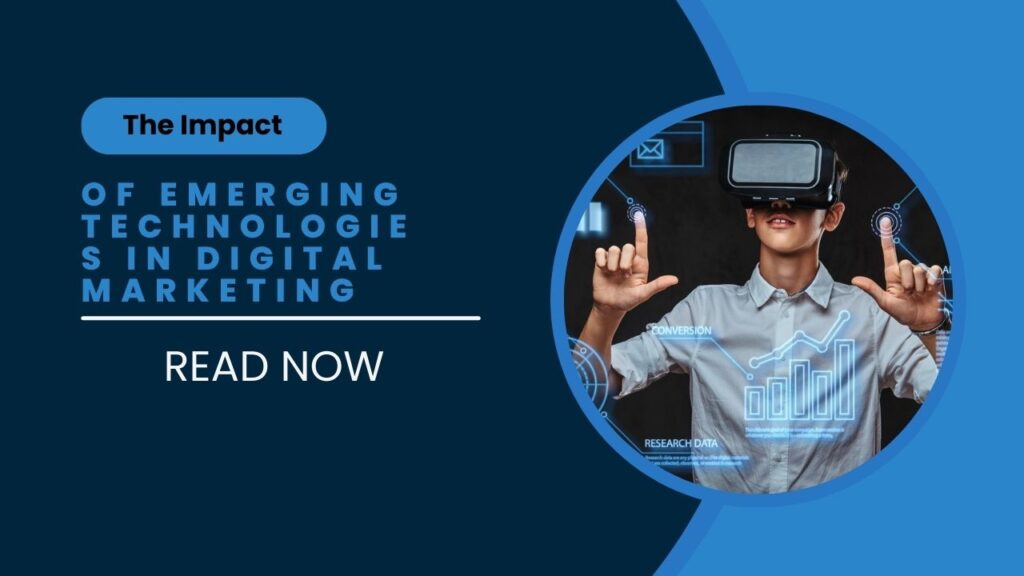Digital marketing is evolving at an unprecedented pace, driven by the continuous advancement of emerging technologies. These innovations are not just shaping the future; they are revolutionizing how businesses connect with their audiences today. From artificial intelligence to blockchain, the tools at a marketer’s disposal are more powerful and sophisticated than ever before. This blog post explores the impact of emerging technologies on digital marketing and how these technologies are transforming digital marketing strategies, enhancing customer experiences, and driving business growth.
Table of Contents
Emerging Technologies in Digital Marketing
Artificial Intelligence and Machine Learning in Digital Marketing
Artificial intelligence (AI) and machine learning (ML) are at the forefront of this technological revolution. These technologies enable marketers to analyze vast amounts of data and generate actionable insights, leading to more personalized and effective marketing campaigns.
AI-driven tools, such as chatbots and predictive analytics, are becoming indispensable in digital marketing. Chatbots provide instant customer support, answering queries and guiding users through their purchasing journey. Predictive analytics, on the other hand, helps marketers anticipate customer behavior, optimize campaigns, and improve ROI.
The benefits of AI and ML in marketing are numerous. They allow for greater personalization, ensuring that customers receive relevant content and offers. Automation streamlines marketing processes, saving time and resources. Most importantly, AI and ML enhance the overall customer experience, leading to higher satisfaction and loyalty.
Leveraging Big Data for Marketing Insights
Big data is another game-changer in digital marketing. With the explosion of digital interactions, marketers have access to unprecedented amounts of data about their customers. Big data analytics enables marketers to make sense of this data, uncovering trends and insights that drive better decision-making.
Data-driven marketing campaigns are more effective because they are based on actual customer behavior and preferences. For example, by analyzing customer data, a retailer can identify which products are most popular among specific demographics and tailor their marketing efforts accordingly.
IoT’s Role in Digital Marketing
The Internet of Things (IoT) is connecting devices and generating data at an astounding rate. This connectivity presents new opportunities for marketers to engage with consumers in innovative ways.
IoT devices, such as smart home appliances and wearable technology, provide real-time data about consumer habits and preferences. Marketers can use this information to create highly targeted and relevant marketing campaigns. For instance, a smart refrigerator can notify users when they are running low on certain groceries and suggest purchasing them from a preferred retailer.
The impact of IoT on consumer behavior is profound. It creates a seamless and integrated experience, where devices anticipate and respond to user needs. For marketers, this means more opportunities to influence purchasing decisions and build stronger customer relationships.
Enhancing Customer Experience with AR and VR
Augmented reality (AR) and virtual reality (VR) are transforming how brands interact with customers. These technologies offer immersive and interactive experiences that can significantly enhance customer engagement.
AR and VR have numerous applications in marketing. For example, AR can enable customers to virtually try on clothes or see how furniture would look in their homes before making a purchase. VR can provide immersive experiences, such as virtual tours of real estate properties or interactive product demonstrations.
The benefits of AR and VR in marketing are clear. They create memorable experiences that capture customer attention and drive engagement. These technologies also reduce the uncertainty and hesitation associated with online shopping, leading to higher conversion rates.
Blockchain’s Impact on Digital Marketing
Blockchain technology, known for its association with cryptocurrencies, is making waves in digital marketing. Its applications in this field are primarily centered around transparency and security.
In digital advertising, blockchain can help combat fraud by providing a transparent and verifiable record of transactions. This ensures that ad impressions and clicks are genuine, which is crucial for maintaining trust between advertisers and publishers.
Blockchain also enhances data security, a growing concern for consumers. By giving users control over their data and ensuring it is not tampered with, blockchain can help build trust and loyalty.
Several companies are already exploring blockchain-based marketing initiatives. For example, the blockchain-based platform Brave rewards users for viewing ads while maintaining their privacy. This model creates a more ethical and transparent advertising ecosystem.
Optimizing for Voice Search
Voice search is rapidly gaining popularity, thanks to the proliferation of smart assistants like Alexa, Siri, and Google Assistant. This shift requires marketers to rethink their SEO strategies to optimize for voice search.
Voice search optimization involves understanding how people speak versus how they type. Voice queries are typically longer and more conversational. Therefore, content should be optimized for natural language and question-based queries.
The impact of voice search on SEO and content marketing is significant. Marketers must focus on creating high-quality, relevant content that answers specific questions. Additionally, optimizing for local search is crucial, as many voice searches are location-based.
Conclusion
The rapid evolution of emerging technologies is reshaping the landscape of digital marketing. These technologies, from AI and big data to IoT, AR, VR, and blockchain, offer new ways to connect with customers, enhance experiences, and drive business growth. Staying ahead of these trends and integrating them into your marketing strategy is essential for success in today’s competitive environment.
As we look to the future, integrating these technologies will only deepen, leading to even more innovative and effective marketing strategies. Embracing these changes now will position your business as a leader in the digital age, ready to meet the ever-evolving needs of your customers.



